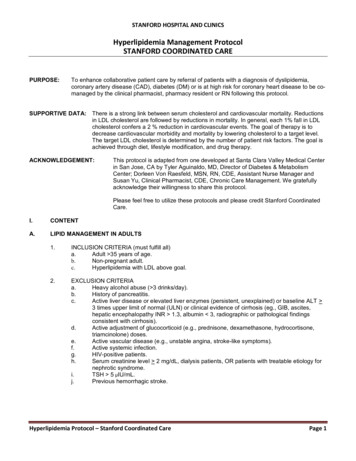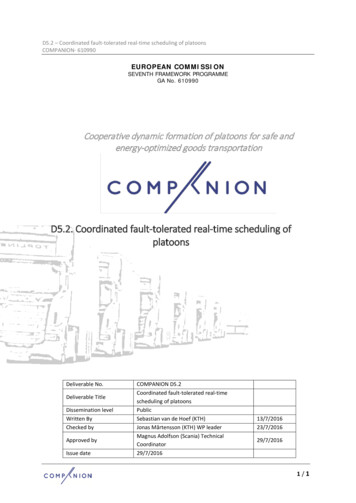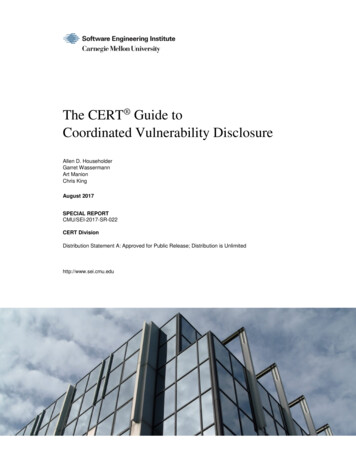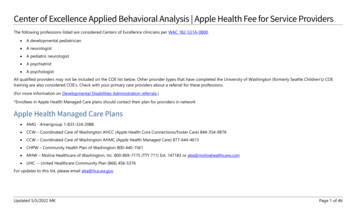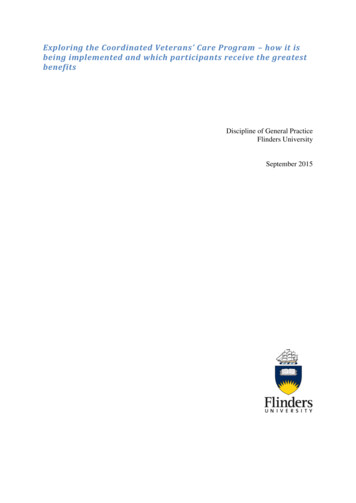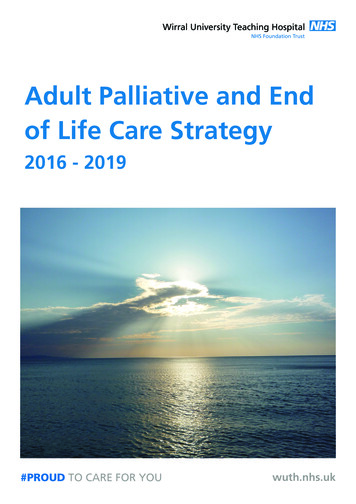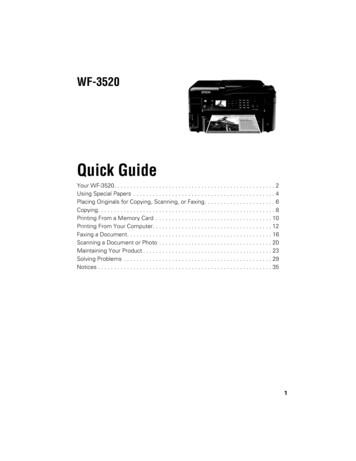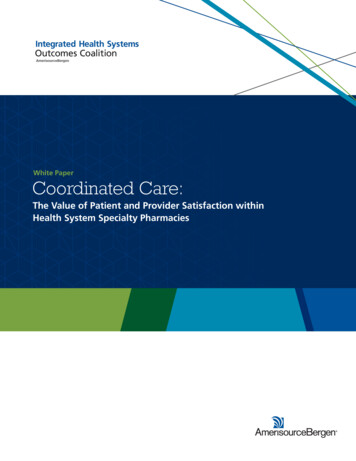
Transcription
White PaperCoordinated Care:The Value of Patient and Provider Satisfaction withinHealth System Specialty Pharmacies
IntroductionCoordinated CareAs specialty medication therapies become a bigger part of the pharmaceuticallandscape, there has been a growth in health systems entering the specialty pharmacyspace. The movement by health systems to the provision of these therapies isimportant to patients as this is an extension of the care model. Specialty medicationsoffer an important shift in therapies for patients. The industry is now at the pointwhere there is a shift from symptom management therapies to disease-modifyingdrugs. The enhanced level of patient-focused care that health systems provide is key toa patient’s success on these therapies. In addition to the improved level of care, healthsystems can capitalize on the potential revenue as a way to finance this infrastructure.With access to their integrated electronic health record (EHR) and ability to serve as acentral hub for provider-led patient care, health systems are a logical fit for deliveringpatient-centered, clinically-coordinated specialty pharmacy services.Patients taking specialty medications often require high-touch, specialized support tominimize adverse events, mitigate financial barriers and improve therapy complianceand adherence. Health system specialty pharmacies (HSSPs) not only provide thisrequired level of service but also minimize transition points for both patients andproviders. Moreover, the continued rise of value-based contracting increases thepressure on health systems to control the quality and execution of patient care,making HSSPs an ideal partner for delivering end-to-end support that improvespatient outcomes.A HSSP’s value, however, extends beyond the financial benefits it can provide to ahealth system. As a key stakeholder in a HSSP, providers recognize the importance ofan in-house specialty pharmacy in enabling greater efficiency and a comprehensiveapproach to patient care. To better understand the true value of an HSSP for patientsand providers, in 2018 the Integrated Health Systems Outcomes Coalition (IHOC)collaborated with five large health systems ( 600 beds) to conduct provider andpatient satisfaction surveys. IHOC aggregated the patient and provider survey data touncover key insights about the role HSSPs play in improving the patient experience.
Coordinated CareProvider Survey ResultsBecause of the constant pressure to increase productivity while providing the highestquality care, health system providers rely on their HSSPs to serve as a trusted andconvenient solution to improve speed-to-therapy. The integrated EHR enablesprescriptions to flow in a coordinated and automated way from discharge to pharmacy,improving efficiency and allowing providers additional time to focus on patient care.HSSP integration:The 2018 IHOC provider satisfaction results validate the important role HSSPs playin provider care delivery. According to the survey, 99 percent of the 130 providerssurveyed feel that having a specialty pharmacy integrated within their health system isimportant or extremely important to them and their patients. One provider shared,“Having a dedicated pharmacist in our division, who worksclosely with me and my patients, has been a game changer. Ithas tremendously improved patient care and my productivity,effectiveness and well-being.”Integrated Health Systems Outcomes Coalition02
Speed-to-therapy:Because access to the patient’s EHR ensures easy access to key patient information,HSSPs can quickly process prior authorizations and expedite prescription dispensing,enabling patients to start therapy sooner – typically within the first 24-72 hours afterthe prescription is received1. Eighty-four percent of providers surveyed expressedthey are extremely and very satisfied with how quickly their HSSP processes patients’specialty prescriptions. One of the surveyed providers noted satisfaction with the HSSPscollaboration: “The staff has been extremely helpful with getting patients started onnew medications,” the provider said. “[The] staff is also excellent in communicationwith providers.”Clinical coordination:As part of the patient’s care team, the HSSP partners with providers in a clinicallycoordinated way to provide support throughout the patient’s therapy journey. Oneprovider added that “having an on-site specialty pharmacist to help us with oralchemotherapy has proven to be a valuable resource not only for our team but alsofor patients and their safety.” Providers are pleased with their HSSP’s level of clinicalexpertise and their ability to provide collaborative care to patients.82%90%76%of providers are extremelyand very satisfied with thecare coordination providedby their HSSPof providers are extremelyand very satisfied with theirhealth system pharmacists’knowledge of medicationsand disease states impactingtheir patientsof providers are extremelyand very satisfied withtheir HSSP’s ability to helpimprove patient adherenceOverall, providers report a 93 percent satisfaction rating towardstheir HSSP and feel that an integrated specialty pharmacy addsvalue to the care they provide their patients.Shared EHR access eliminates patient care silos and allows the provider and healthsystem specialty pharmacist to work as part of a synergistic team to improve speedto-therapy, eliminate unnecessary transition points and reduce access and adherencebarriers. In addition, the shared EHR works as an integrated communication mediafor all of the caregivers to get the most up to date information onmedication-related issues.Integrated Health Systems Outcomes Coalition03
Coordinated CarePatient Survey Results98%While not a direct indicator of quality, high patient satisfaction is correlated with betterwith their HSSP’smedication knowledgepatient experience and health care outcomes in the New England Journal of Medicine,98%also largely capture patient evaluation of care-focused communication with the healthare satisfiedagree theirHSSP provides convenientaccess to medications97%agree theirHSSP helped themunderstand how to usetheir medicationclinical outcomes and effective care-team communication.2 According to a report on“Patient-reported measures not only are strongly correlated with better outcomes butcare team.”3 Health systems recognize the importance and value of patient satisfactionon loyalty, positive market recognition and engagement in their care as a driver forpatient choice. In fact, 54 percent of health system executives list patient satisfactionas one of their three top priorities.4 Of the 354 patients surveyed by IHOC, 97 percentare satisfied with their HSSP. Patients’ satisfaction with their HSSPs stems in large partbecause patients are pleased with their HSSP across a variety of measures.HSSP engagement:One reason for this high satisfaction is the relationships patients form with their healthcare team – a differentiating factor for HSSPs. One HSSP patient noted, “It is wonderfulthat I have competent, caring individuals working as a team to improve my health.”When patients were asked to provide feedback on their HSSP, interactions with theirHSSP staff ranked high. According to the survey, 98 percent of patients are satisfiedwith the helpfulness of their pharmacy staff, and 97 percent view their HSSP as havingthe highest level of customer service.Integrated Health Systems Outcomes Coalition04
Of the354patients surveyedby IHOCThe patient survey results also convey that patients like personalized interactions withmembers of their care team. This is in part because 93 percent of patients interact withtheir HSSP at least once a month with many interacting considerably more, as muchas once per week. While these numbers do not largely differentiate from interaction97%points with non-HSSPs, frequent touch-points create a strong bond between thewith their HSSPimproved their comfort in asking clarifying questions, raising concerns about theirare satisfiedpatient and the health system as a whole. Patients report that team-based caremedication regimen and collaborating in developing their treatment plan.5 Patientsrated their HSSPs ability to address questions and concerns effectively favorably.97%satisfaction with the HSSP’s ability tounderstand their questions/issues96%percent satisfaction with HSSP’s ability to address theirquestions/issues in a way that they could understand96%satisfaction with HSSP’s ability to dealwith questions/issues promptlyAdherence support:This level of coordinated care and support among HSSPs resonates strongly withpatients and results in better adherence to therapy. One recent study by the CDCshowed that patients working with a HSSP had an 89 percent medication adherencerate compared with 74 percent for patients filling prescriptions at specialty pharmaciesoutside of their health system.5 The support patients receive from their HSSP helpsthem remain on their medication longer so they can achieve the greatest outcomesfrom their therapy.Integrated Health Systems Outcomes Coalition05
Coordinated CareWhy provider and patientsatisfaction mattersWhile survey results show that providers would like to keep patient prescriptionswithin the health system, specialty prescriptions are often routed to non-healthsystem specialty pharmacies based on how manufacturer and payer networks areestablished. To lower costs and maximize revenue, payers and manufacturers createlimited distribution networks that direct patients to preferred specialty pharmacies.These networks are in place to collect data, control supply and streamline operations.However, these networks often reduce and, in some cases, eliminate patient andprovider choice for filling specialty prescriptions.Payer and manufacturer access challenges result in providers being forced to triagetheir patients’ specialty pharmacy service outside of their health system’s ecosystem,making it harder for health systems and providers to control the quality of care andsupport their patients receive. Moving prescriptions out of the health system alsoresults in EHR gaps, fragmented care and more confusion for the patient.Patient and provider satisfaction survey results show that HSSPs can deftly handlepatient assistance and eligibility issues as well as patient questions and care on aholistic level, resulting in faster time to treat and fewer patient complaints. Thesesatisfaction results are important data points for payers and manufacturers to considerwhen deciding to include HSSPs in their networks. With HSSPs on track to become thefastest growing sites of care over the next five years,6 it will be incumbent on payersand manufacturers to include them as part of their channel strategy because of theirunique ability to provide the highest level of coordinated, specialized patient care.1Proprietary SourceCathl Doyle, Laura Lennox, et al., A systematic review of evidence on the links between patient experience and clinical safety and effectiveness,The British Medical Journal, November 12, 2012, accessed April 2019 at bmjopen.com2Matthew P. Manary, MSE, William Boulding, PhD, et al., Perspective: The Patient Experience and Health Outcomes, The New England Journal ofMedicine, December 26, 2012, accessed April 2019 at nejm.org3Chelsea Rice, 5 Ways to Raise HCAHPS Scores via Staff Engagement, Health Leaders, January 28, 2013, accessed April 2019 athealthleadersmedia.com4Andrea B. Neiman, PhD; Todd Rupar, PhD, et al., CDC Grand Rounds: Improving Medication Adherence for Chronic Disease Management Innovations and Opportunities, Centers for Disease Control and Prevention; November 17, 2017, accessed April 2019 at cdc.gov5Craig A. Pederson, BSPharm, PhD, FAPhA, Philip J. Schneider, MS, FASHP, FFIP, FASPEN, et al., ASHP National Survey of Pharmacy Practice inHospital Settings: Prescribing and Transcribing – 2016, American Journal of Health-System Pharmacy, July 2017, accessed April 2019 at ajhp.org6Integrated Health Systems Outcomes Coalition06
Katie McMillen, PharmD, MPHSenior Director, Operations, IHOCDr. Katie McMillen is the senior director of IHOC operations where sheoversees data integration and research projects that demonstrate the valueof health system specialty pharmacies. Additionally, she facilitates initiativesfor members of IHOC to achieve their key strategic goals and supports themission of the coalition in improving patient outcomes and achieving accessto specialty products.Before IHOC, Katie served as the director of pharmacy for the oncologyservice line and specialty pharmacy services at Froedtert and the MedicalCollege of Wisconsin where she was responsible for the strategicdevelopment and operational execution of three dedicated cancer centers,three community infusion sites and inpatient oncology services across thesystem. While at Froedtert, she developed and managed Froedtert’s URACaccredited specialty pharmacy program. Before Froedtert, Katie workedas an operations manager at the University of Pittsburgh Medical Centerwhere she also completed a two-year health care administration residency.She earned a PharmD and MPH with an emphasis in pharmacyadministration from the University of Pittsburgh.Richard F. Demers, RPh, MS, FASHPChief Administrative Officer, Ambulatory PharmacyServices, University of Pennsylvania Health SystemAs the chief pharmacy executive, Richard Demers is responsible for allambulatory pharmacy services across the health system which includesinfusion, retail and specialty pharmacy services. He directs all ambulatorypharmacy services across six hospitals, nine retail pharmacies and threeinfusion satellites in the health system. While chief administrative officer,the department of pharmacy received a “Best Practices Award” from ASHPin 2013 recognizing the professional practice model developed at HUP.Richard is recognized as a Fellow of the American Society of Health SystemPharmacists (ASHP). He has served as the president of the PennsylvaniaSociety of Health System Pharmacists. He is currently the president-elect ofthe Pennsylvania Pharmacists Association.He earned his BS at Northeastern University, an MS in hospital pharmacyfrom The Ohio State University and his residency in hospital pharmacy fromOSU Hospitals. After completing his postgraduate training, Rick served asassistant director of pharmacy at OSUH for four years. He then practiced asdirector of pharmacy at Exeter Hospital in Exeter, New Hampshire.
About IHOCThe Integrated Health Systems OutcomesCoalition (IHOC) is committed to supportingand improving the access, value and deliveryof quality care for patients receiving specialtymedications through a unique partnershipbetween health systems, manufacturers, payersand supply chain partners. IHOC, an independentLLC created by AmerisourceBergen, is usingactionable data to demonstrate the value ofcoordinated patient care services provided by thehealth system specialty pharmacy.Visit ihocnetwork.com to learn more. 2019 Integrated Health Systems Outcomes Coalition. All rights reserved.
results in EHR gaps, fragmented care and more confusion for the patient. Patient and provider satisfaction survey results show that HSSPs can deftly handle patient assistance and eligibility issues as well as patient questions and care on a holistic level, resulting in faster time to treat and fewer patient complaints. These

